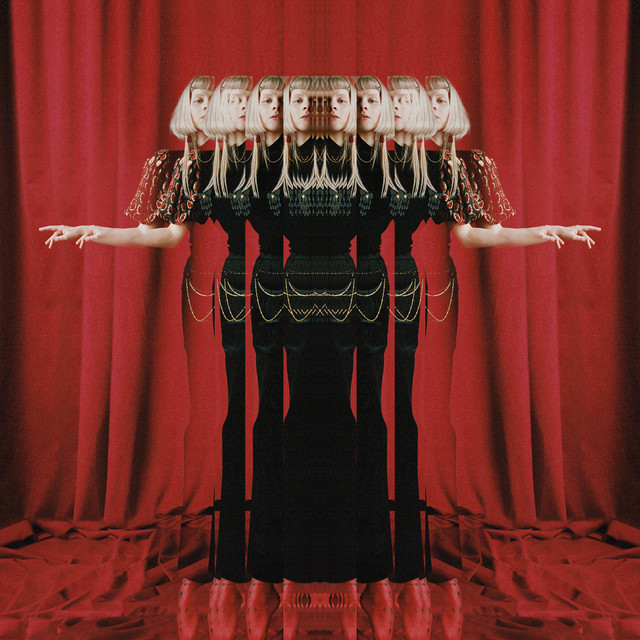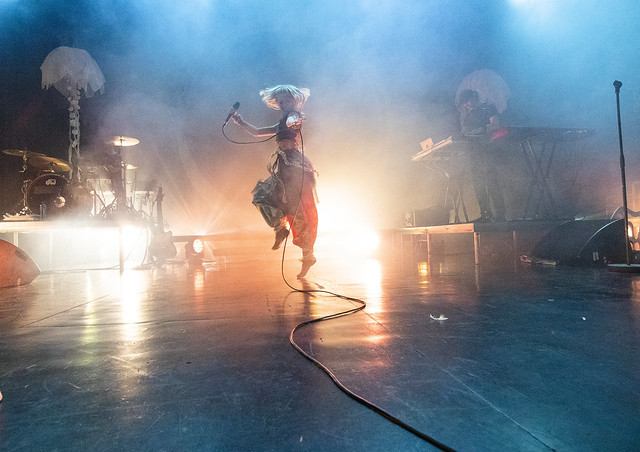On her last two albums, which really was one album split in two, Aurora declared her own queendom. And she’s still reigning supreme!
It was so hard to begin writing this review. Because this record is a masterpiece. It’s so beautiful, so wonderful and so full of joy, sadness and things that will move you… it’s just so darn awesome that it’s hard to know what to include and what to leave out.
Aurora has a position on the international music market that I don’t think my fellow Norwegians have quite grasped it yet. We’re talking about billions(!) of streams. We’re talking about an artist that can go abroad and sell out concert halls with so many seats that other Norwegian artists are gnashing their teeth with envy. And the reception she gets on the huge international festival scene is moving to observe. Because Aurora fans are hardcore fans. They absorb everything she says and does, even the long aimless monologues she sometimes starts rambling on stage.
Will the same hardcore fans embrace The Gods We Can Touch? I don’t have a single reason to suspect anything of the contrary. Sure, six of the songs have already been released over the past 18 months as digital singles, and they have been very well received indeed. However, there is over an hour of music here, spread over 15 tracks, each one telling a story involving one Greek god or goddess each. And there isn’t a single boring moment here.
She explores new areas where she hasn’t been before. The voice, oh that beautiful voice, and the Enya like vocal harmonies makes it hard to not to realise you’re listening to Aurora. The opening track, a short intro with wordless humming, is a perfect example.
She’s bounces effortlessly between genres from one track to the next, just as she jumps stylistically between various decades for each song. On the second track, Everything Matters, we are in a landscape you would expect to find Joni Mitchell, if we were in 1971. But suddenly we are in Kate Bush’s world, just listen to the deep and processed background vocals.
Giving in to Love was released last year and is a great combination of 90s Massive Attack and Aurora like she sounded on her previous album. And the coda, with the irresistible “la-la-ing towards the end creates goose bumps down your arms with its wall of sound production.
Cure for Me was released last year. The song was promoted with a video where Aurora did both the direction and the choreography (she even made a video where she taught you the moves) and it’s like something Madonna could have released in her Music period. Only with better singing, of course. There is something so liberating in the rhythm track and the synth in the chorus that it almost makes even a slightly spastic person like me wanna get up and dance. Almost.
You Keep Me for Love is at the start very reminiscent of Sonny & Cher’s Bang Bang (My Baby Shot Me Down), but it soon transforms into an angle like chorus and it’s among the highlights of the album.
Exists for Love, even released physically in 2020, sounds like a Gershwin ballad, released in the 1930s, with it’s acoustic sound.
And then there is The Innocent. It starts with a ragtime piano and moves on into a wonderful contrasting 80s feeling. That 80s feeling is kept in a song like A Temporary High. This is the best track of the album, and I wasn’t surprised when it was chosen as the next single and video. The mood is going to hit the roof when she performs this during concerts in the future. It’s the new Conqueror, a song Aurora refuses to play these days.
And so it goes. Every song has something new and unique that makes it stand out from the other songs of the album. Aurora’s voice and vocal harmonies penetrates it all, and the production goes from simple rhythms and backing tracks to huge sound pictures with lots of delay and echo. The lyrics is about the human condition, being true to oneself, letting people be who they really are, and about nature and environment. All presented through a prism of tales about Greek gods and goddesses.
One minute we are in Paris (Artemis) with accordions before we jump to Ennio Morricone in Blood in the Wine, while This Could be Dream is something Sigrid would have been proud of. Everything ends with the 60s trip A Little Piece of Heaven.
And when we reach that point, you realise you’re sorry that it’s over. 15 songs later! On the last two albums, Aurora declared her own queendom. And she still reigns supreme!



